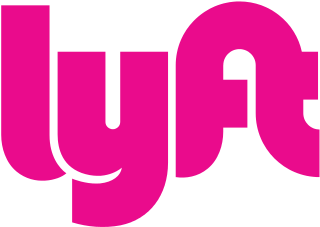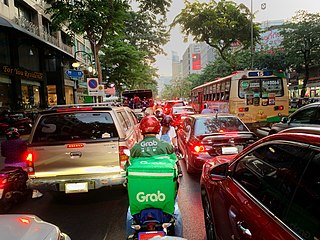
A high-occupancy vehicle lane is a restricted traffic lane reserved for the exclusive use of vehicles with a driver and one or more passengers, including carpools, vanpools, and transit buses. These restrictions may be only imposed during peak travel times or may apply at all times. According to the criteria used there are different types of lanes: temporary or permanent with concrete barriers; two-directional or reversible; and exclusive, concurrent or contraflow lanes working in peak periods. The normal minimum occupancy level is 2 or 3 occupants. Many jurisdictions exempt other vehicles, including motorcycles, charter buses, emergency and law enforcement vehicles, low-emission and other green vehicles, and/or single-occupancy vehicles paying a toll. HOV lanes are normally introduced to increase average vehicle occupancy and persons traveling with the goal of reducing traffic congestion and air pollution, although their effectiveness is questionable.

Carpooling is the sharing of car journeys so that more than one person travels in a car, and prevents the need for others to have to drive to a location themselves.

Uber Technologies, Inc., commonly known as Uber, is an American technology company. Its services include ride-hailing, food delivery, package delivery, couriers, freight transportation, and, through a partnership with Lime, electric bicycle and motorized scooter rental. The company is based in San Francisco and has operations in over 900 metropolitan areas worldwide. It is one of the largest firms in the gig economy.

Slugging, also known as casual carpooling, is the practice of forming ad hoc, informal carpools for purposes of commuting, essentially a variation of ride-share commuting and hitchhiking. A driver picks up these non-paying passengers at key locations, as having these additional passengers means that the driver can qualify to use an HOV lane or enjoy toll reduction. While the practice is most common and most publicized in the congested Washington, D.C. metropolitan area, slugging also occurs in San Francisco, Houston, and other cities.

Indian Railway Catering and Tourism Corporation (IRCTC) is under the ownership of Indian Railways, Ministry of Railways, Government of India that provides services like ticketing, catering, and tourism services for the Indian Railways. It was initially wholly owned by the Government of India and operated under the administrative control of the Ministry of Railways, but has been listed on the National Stock Exchange since 2019, with the Government continuing to hold majority ownership.

Taxis of Singapore come in two main varieties. Traditional taxi companies offer flag down and call bookings and their drivers are hired employees of the company. Ridesharing companies allow bookings through a smartphone, allowing ease for passengers, these are mostly known as private hire vehicles (PHV). Their apps also allow anyone, provided they meet various requirements depending on the company, to work and pick up passengers with their own vehicle, be it owned or rented.

Taxis in Australia are highly regulated by each Australian state and territory, with each state and territory having its own history and structure. In December 2014, there were 21,344 taxis in Australia. Taxis in Australia are required to be licensed and are typically required to operate and charge on a fitted taximeter. Taxi fare rates are set by State or Territory governments. A vehicle without a meter is generally not considered to be a taxi, and may be described, for example, as a hire car, limousine, carpool, etc. Most taxis today are fuelled by liquid petroleum gas. A2B Australia owns and operates the Cabcharge payment system, which covers 98% of taxis in Australia, and operates one of Australia's largest taxi networks.

Lyft, Inc. develops, markets, and operates a mobile app, offering vehicles for hire, motorized scooters, a bicycle-sharing system, and food delivery. The company is based in San Francisco, California and operates in 644 cities in the United States and 12 cities in Canada.

John Zimmer is the co-founder and president of Lyft, an on-demand transportation company, which he founded with Logan Green in 2012.

Shared transport or shared mobility is a transportation system where travelers share a vehicle either simultaneously as a group or over time as personal rental, and in the process share the cost of the journey, thus creating a hybrid between private vehicle use and mass or public transport. It is a transportation strategy that allows users to access transportation services on an as-needed basis. Shared mobility is an umbrella term that encompasses a variety of transportation modes including carsharing, Bicycle-sharing systems, ridesharing companies, carpools, and microtransit.

Zimride by Enterprise Holdings is an American carpool program that matches inter-city drivers and passengers through social networking services. It is offered to universities and businesses as a matchmaking service. The company was founded in May 2007. After the launch of the Lyft app in May 2012 for intra-city rides, the Lyft app rapidly grew and became the focus of the company. Zimride officially renamed as Lyft in May 2013, and the Zimride service was sold to Enterprise Holdings in July 2013. As of July 2013, the service had over 350,000 users and has partnerships with Facebook and Zipcar.

Wingz is a vehicle for hire company that provides private, scheduled, and fixed-price rides in 30 major cities across the United States via mobile app. The service provides rides anywhere in the cities it serves, with a focus on airports. Wingz offers the ability to request specific drivers for rides and allows users to build a list of their favorite drivers for future bookings.
A ridesharing company is a company that, via websites and mobile apps, matches passengers with drivers of vehicles for hire that, unlike taxicabs, cannot legally be hailed from the street.

Ola Cabs is an Indian multinational ridesharing company offering services that include vehicle for hire and food delivery. The company is based in Bengaluru, Karnataka, India. As of October 2019, Ola was valued at about US$6.5 billion. A variety of venture capitalists including Softbank have large stakes in the company.
Many communities, governments, and organizations have established rules and regulations that specifically govern ridesharing companies. In some jurisdictions, for-profit ridesharing operations are completely illegal. Regulations can include requirements for driver background checks, fares, the number of drivers, and licensing.

Grab Holdings Inc., commonly known as Grab, is a Singaporean multinational company headquartered in Singapore. In addition to transportation, the company offers food delivery and digital payments services via a mobile app. Starting in 2012 as the MyTeksi app based in Kuala Lumpur, Malaysia, it expanded the next year as GrabTaxi. It has since expanded into other services, following the "super app" model. In 2014, it moved its headquarters to Singapore and renamed itself to just Grab.
asterRIDE is an referral company similar to a Kayak.com or Expedia.com that operates and markets transportation services on behalf the limousine and taxi operators across the cities they operate. AsterRIDE markets their web platform and mobile app asterRIDE, which connects passengers with taxi drivers and for-hire chauffeurs in its cities of operation. As of June, 2015, asterRIDE is available in ten U.S. cities and growing: Chicago, Everett, Fort Lauderdale, Los Angeles, Miami, Naples, Orlando, Phoenix, San Diego, San Francisco, Seattle, and West Palm Beach. According to a release on their website, Las Vegas, New York City, Houston, and Philadelphia will be new markets very soon.
Peer-to-peer ridesharing can be divided along the spectrum from commercial, for-fee transportation network companies (TNC) to for-profit ridesharing services to informal carpooling arrangements. The term transportation network company comes from a 2013 California Public Utilities Commission ruling that decided to make the TNC revenue model legal. Almost all modern peer-to-peer ridesharing schemes rely on web application and mobile app technology.

inDriver is A Russian ride-hailing service with more than 100 million users operating in 546 cities from 34 countries. inDriver is one of the top 3 ridesharing and taxi apps worldwide by downloads. The company operates in Russia, Egypt, Kazakhstan, Kyrgyzstan, Nepal,Uzbekistan,Armenia, Botswana, Brazil, Mexico, Guatemala, Colombia, Peru, El Salvador, Chile, Ecuador, Costa Rica, Panama, Honduras, Dominican Republic, Bolivia, Nicaragua, Tanzania, South Africa, Kenya, Morocco, Uganda, Nigeria, Botswana, India, Indonesia, Malaysia, Thailand and Pakistan. The company was founded in Yakutsk in 2012.

Homobiles is an American nonprofit organization founded in 2011 which provides rides primarily to the San Francisco LGBT community on a pay-what-you-can model. Lynn Breedlove founded the organization as an alternative to taxi services and public transportation in order to counter discrimination against drag queens, transgender riders, and other members of the LGBT community. Rides are arranged through phone call, text message, or mobile application similar to other transportation network (ridesharing) companies.
















